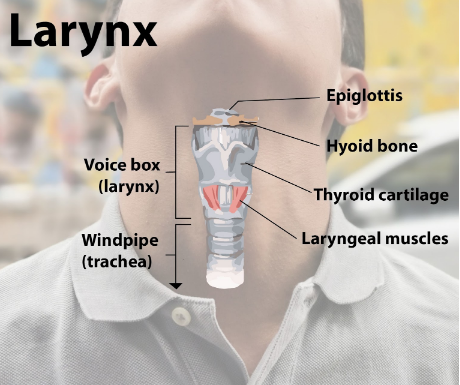
Draw a human vocal system diagram and explain its working principle.
Answer
526.8k+ views
Hint: the vocal system is found in the neck region of the human alimentary canal. It is located in between the pharynx and the trachea and is responsible for the voice of the humans. It is usually more prominent in the case of males.
Complete answer:
The larynx is also called a voice box which is the sound-producing organ of human beings. Its other name is Adam’s apple. This organ helps in the production of sound along with its involvement in the process of respiration. It also acts as a barrier between the windpipe and food pipe that prevents choking while eating. As a boy becomes an adult Adam’s apple increases in size and will be easily visible and palpable.
The larynx is made up of cartilage which is a triangular-shaped structure. It is attached to its nearby tissues with the help of the elastic connective and fibrous tissues. They have also termed the vocal cords since they are responsible for the production of sound. It helps in the process of breathing when it joins with the tracheal inner part. It is made up of six cartilages that together constitute the laryngeal skeleton. The supraglottis, the glottis, and the subglottis are the three parts of the inner larynx.
The pharynx is present below the larynx which is divided into two parts; the trachea and the esophagus. The larynx has two types of muscles – intrinsic muscles (present between the larynx and its surrounding parts), and extrinsic muscles (present inside the larynx). The main function of the larynx is the manipulation and maintenance of the pitch and volume of the sound. For the process of respiration, the larynx passes the air to the lungs.

Note:
From the ancient Greek word the word larynx is derived which means the voice box. The larynx constitutes the vocal folds that result in the change in the phonation which also includes the pitch and the volume of the sound. The vagus nerve surrounds the larynx while the sensory information is sent through the superior laryngeal nerve to the glottis and laryngeal vestibule.
Complete answer:
The larynx is also called a voice box which is the sound-producing organ of human beings. Its other name is Adam’s apple. This organ helps in the production of sound along with its involvement in the process of respiration. It also acts as a barrier between the windpipe and food pipe that prevents choking while eating. As a boy becomes an adult Adam’s apple increases in size and will be easily visible and palpable.
The larynx is made up of cartilage which is a triangular-shaped structure. It is attached to its nearby tissues with the help of the elastic connective and fibrous tissues. They have also termed the vocal cords since they are responsible for the production of sound. It helps in the process of breathing when it joins with the tracheal inner part. It is made up of six cartilages that together constitute the laryngeal skeleton. The supraglottis, the glottis, and the subglottis are the three parts of the inner larynx.
The pharynx is present below the larynx which is divided into two parts; the trachea and the esophagus. The larynx has two types of muscles – intrinsic muscles (present between the larynx and its surrounding parts), and extrinsic muscles (present inside the larynx). The main function of the larynx is the manipulation and maintenance of the pitch and volume of the sound. For the process of respiration, the larynx passes the air to the lungs.

Note:
From the ancient Greek word the word larynx is derived which means the voice box. The larynx constitutes the vocal folds that result in the change in the phonation which also includes the pitch and the volume of the sound. The vagus nerve surrounds the larynx while the sensory information is sent through the superior laryngeal nerve to the glottis and laryngeal vestibule.
Recently Updated Pages
Master Class 11 Computer Science: Engaging Questions & Answers for Success

Master Class 11 Business Studies: Engaging Questions & Answers for Success

Master Class 11 Economics: Engaging Questions & Answers for Success

Master Class 11 English: Engaging Questions & Answers for Success

Master Class 11 Maths: Engaging Questions & Answers for Success

Master Class 11 Biology: Engaging Questions & Answers for Success

Trending doubts
One Metric ton is equal to kg A 10000 B 1000 C 100 class 11 physics CBSE

There are 720 permutations of the digits 1 2 3 4 5 class 11 maths CBSE

Discuss the various forms of bacteria class 11 biology CBSE

Draw a diagram of a plant cell and label at least eight class 11 biology CBSE

State the laws of reflection of light

10 examples of friction in our daily life




